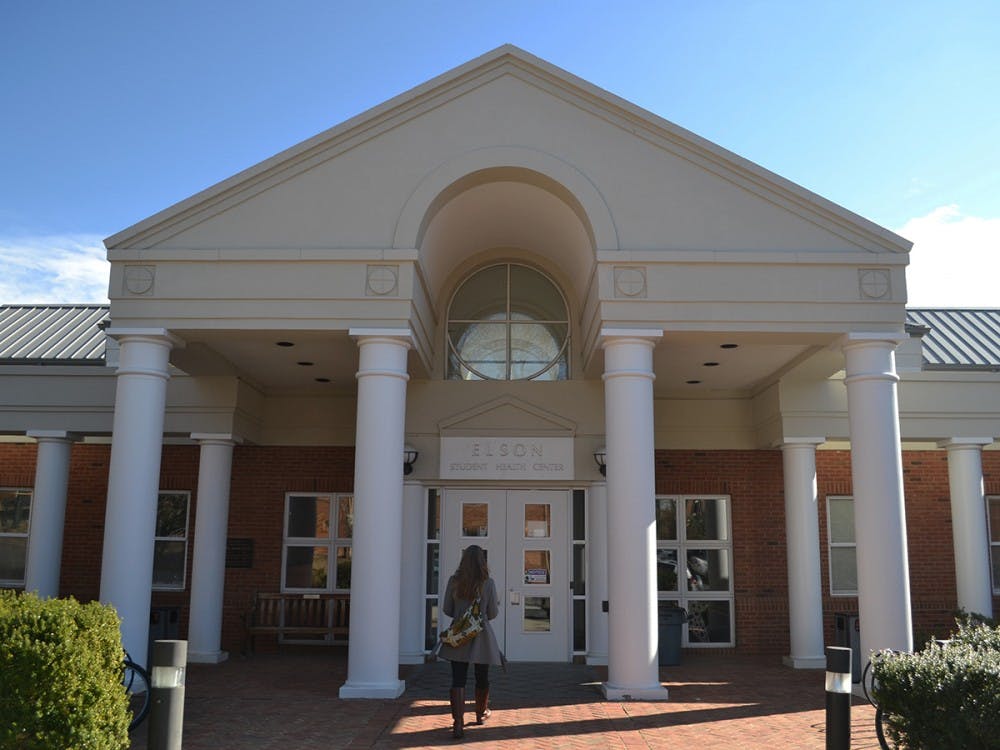Many students have expressed frustrations about Counseling and Psychological Services at the University, including complaints regarding wait times and limited therapy sessions. Located at the Elson Student Health Center, CAPS is the University’s student counseling clinic that offers free services—including visits with psychologists and psychiatrists—to students.
CAPS Director Nicole Ruzek said in an email that the center provided 14,133 appointments to over 2,400 students in 2017.
The process of starting counseling at CAPS begins with a phone screening with a CAPS clinician. The student will receive a recommendation for an appointment based on this conversation. These recommendations can span from receiving a same-day emergency appointment to longer wait times or even to being referred to another office, including off-Grounds or online help. For more time-sensitive cases, CAPS also offers an emergency hotline.
Some students, including third-year College students Claire Burke and Rachel Davies, said they have concerns about the efficacy of CAPS.
Burke’s main concerns about CAPS stem from its limited capacity. Specifically, she said that the number of psychologists and services CAPS offers was less than the number of students seeking help.
Ruzek said CAPS has increased its capacity over the past five years by adding six full-time positions. Additionally, the University plans to construct a new building for the Department of Student Health & Wellness, which will allow for expansion of services as well as an in-person triage rather than phone screening.
Both Davies and Burke said they were also concerned about the long wait times.
"In theory, CAPS is like the best thing possible because it's free counseling, it's right on Grounds, easy to access..." Davies said. "But they do have a rather long wait time to be able to be processed, and you have to be processed in order to be seen by a counselor."
Burke said she had to wait three weeks to see someone when she started going to CAPS.
“I was not diagnosed with something severely life-threatening but if someone was thinking of taking their life and they had to wait three weeks to have an appointment with someone ... That could be the difference between life or death,” Burke said.
Ruzek said that during most months, students can access care within a week or the same day in emergency situations. However, she said that during the busiest months of the year — October, November, March and April — when the wait time can extend to two to three weeks, CAPS offers other options for students to get support, including therapy and support groups, a cancellation waitlist and care management services to connect students with providers in the community.
Davies also said she was concerned about the limited amount of individual therapy. Davies said students only have a limited number of individual sessions whereas group therapy is unlimited.
“They’re there if you want someone to talk to in the moment like the crisis hotline or if you want to talk to someone about a brief incident in your life, but if you’re someone like me who deals with ongoing mental illness, then you need something a little more stable,” Davies said.
Davies said the limited number is an issue because students who want a long-term therapy option have to seek alternative options off-Grounds.
“I went for my first year and then used up the number of sessions I had and then had to seek outside counseling,” Davies said. “In a place like Charlottesville, there are many people available but they don’t all take every kind of insurance the way that U.Va. does. If you don’t have a car, you have to find another way of transporting.”
Davies said that although CAPS has a specialist who helps people access off-Grounds resources, she believes that there are still many barriers such as insurance and transportation.
Ruzek said CAPS just launched an online referral database and hired a second care manager this year.
“CAPS care managers ... Help students overcome barriers, including problems navigating insurance, transportation logistics, financial limitations, co-occurring health concerns and other difficulties meeting basic needs,” Ruzek said.
J. Nile Wagley, a therapist at Rational Therapeutics and a visiting assistant professor of psychiatry and neurobehavioral sciences, sees students who have been referred to him after completing the limited number of individual therapy sessions at CAPS.
Wagley said in an email that he has heard good reports about the treatment at CAPS. However, he said that addressing students’ concerns, as well as decreasing the stigma of mental illness, is crucial.
“While talking, raising awareness and other bottom-up approaches can be helpful and are important, it’s policy issues that really have large impacts on this,” Wagley said.
More broadly, Burke said that mental illness should be discussed more on the University level to reduce the stigma about mental illness.
“I think that the more that we talk about it, the more that it becomes something that people can share their experience and know that they’re not alone,” Burke said.
Ruzek said CAPS has undertaken initiatives to address concerns about mental illness on the University level, including more than 200 outreach presentations last school year, a suicide prevention program and a Mental Wellness Screening Day.
Jamie Leonard, director of the Office of Health Promotion, said that the University has made improvements to address the stigma surrounding mental health.
“79.0 percent of U.Va. students would consider seeking help from a mental health professional if they were having a personal problem that was really bothering them,” Leonard said in an email, referencing the February 2016 National College Health Assessment.
Wagley said that this issue extends into the need for healthcare reform.
“It goes beyond mental health and into healthcare reform,” Wagley said. “Those without access to resources, which is a large proportion of our society, also get healthcare but they must obtain [it] through less efficient and effective means.”







